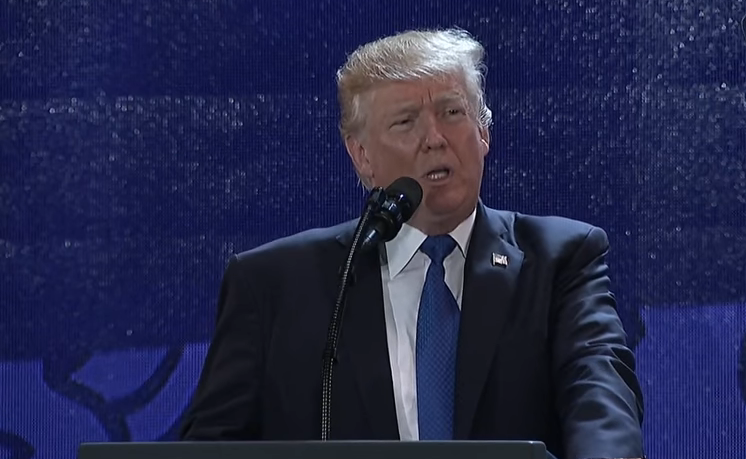LISTEN NOW! (Or WATCH FULL PROGRAM!) We are continuing to join President Trump on his 5 Country Asian Tour. As he started in Japan, and then went to China, and to South Korea, he has recently visited Danang, Vietnam, where he spoke at the APEC CEO Summit. Vietnam is a close ally with the United States, and strong trading partners. As the President repeatedly spoke about international trade during his campaign for President, he focuses on this important topic during his speech.
As in all of his recent speeches to the Asian countries, the President is quick to share the optimism experienced in the United States because of the achievements being experienced in the economy on the home front. This is important to recognize with our allies that we are trading with. As the President shares these successes, he points to the additional successes that are being experienced in the Asian-Pacific region. ” But even more, I’ve had the honor of sharing our vision for a free and open Indo-Pacific — a place where sovereign and independent nations, with diverse cultures and many different dreams, can all prosper side-by-side, and thrive in freedom and in peace.” As the President continues, he recalls the long heritage of history in this region and the relationship with the United States that forges the strength of the bonds of relationship that endure today. From the first American ship sailing to China, to a relationship with the Kingdom of Thailand starting in the early 1800’s, this region has deep wells of rapport with one another.
The President points to the many successes in this region because of the beautiful people and the fortitude to overcome opposition and hardship. “What the countries and economies represented here today have built in this part of the world is nothing short of miraculous. The story of this region in recent decades is the story of what is possible when people take ownership of their future.” It is an additional miracle to remember that only a few short decades ago, our two nations were at war with one another. Today, Vietnam and the United States are close allies.
When looking across the globe, and the achievements made, some may not be aware at the accolades that have been experienced in Vietnam. “Today, an opening Vietnamese economy is one of the fastest-growing economies on Earth. It has already increased more than 30 times over, and the Vietnamese students rank among the best students in the world.” To add to the region’s success, Indonesia has experienced growth as well. “Since the 1990s, Indonesia’s people have lifted themselves from poverty to become one of the fastest-growing nations of the G20. Today, it is the third-largest democracy on Earth.” As the President demonstrates up-to-date on what has been achieved, he also describes the advancements in Malaysia, the Philippines, and Thailand, whose capital is now “the most visited city on Earth”.
Considering all of these achievements, the President wants to remind all of those in attendance, the importance of their relationship with the United States. “Today, I am here to offer a renewed partnership with America to work together to strengthen the bonds of friendship and commerce between all of the nations of the Indo-Pacific, and together, to promote our prosperity and security.” Speaking specifically about our trade relationships, the President underscores the priority of balance and fairness. “When the United States enters into a trading relationship with other countries or other peoples, we will, from now on, expect that our partners will faithfully follow the rules just like we do.” The President speaks openly optimistically as things have not always transpired as they should have. “We lowered or ended tariffs, reduced trade barriers, and allowed foreign goods to flow freely into our country. But while we lowered market barriers, other countries didn’t open their markets to us.”
According to the President, when the United States sought to act through private enterprises, other nations resorted to relying upon government organizations. “They ignored the rules to gain advantage over those who followed the rules, causing enormous distortions in commerce and threatening the foundations of international trade itself.” The countries that carried out these practices may not have known the devastating consequences that have been caused. “Jobs, factories, and industries were stripped out of the United States and out of many countries in addition. And many opportunities for mutually beneficial investments were lost because people could not trust the system.” Up to this day, hope has been lost that the day of fair trade would arrive. It is because of this sad reality that the President speaks on behalf of the United States, to this region, in this critical hour.
When looking at past administrations, the President can empathize, understanding why countries traded with the United States as they did. But, the President doesn’t miss this opportunity to right what has been done wrong in the past. “I wish previous administrations in my country saw what was happening and did something about it. They did not, but I will.” As he continues, “From this day forward, we will compete on a fair and equal basis. We are not going to let the United States be taken advantage of anymore. I am always going to put America first the same way that I expect all of you in this room to put your countries first.”
Taking into consideration of the past, the President clarifies that changes are in order to how the United States will enter into future trade agreements. “What we will no longer do is enter into large agreements that tie our hands, surrender our sovereignty, and make meaningful enforcement practically impossible.” Considering the President’s long history of business, he fully understands that agreements must benefit both sides of the agreement. “Instead, we will deal on a basis of mutual respect and mutual benefit. We will respect your independence and your sovereignty.” Being mindful of the rules laid out in the partnerships within the region, the President longs to work with all the nations. But, the United States “will no longer turn a blind eye to violations, cheating, or economic aggression”. With resolute clarity, the President adds, “Those days are over. We will no longer tolerate the audacious theft of intellectual property.”
President Trump understands that in order for strong partnerships and agreements to be a reality, there first must be strong nations. “We seek strong partners, not weak partners. We seek strong neighbors, not weak neighbors. Above all, we seek friendship, and we don’t dream of domination.” It is a beautiful reminder that success is realized when everyone succeeds, not just one entity. As the President recalls the need for all nations to deal fairly, he also addresses the urgency and importance for all nations to stand up to confront the evils of security. “As I have said many times before: All civilized people must come together to drive out terrorists and extremists from our societies, stripping them of funding, territory, and ideological support. We must stop radical Islamic terrorism. So, let us work together for a peaceful, prosperous, and free Indo-Pacific.”
President Trump is doing an outstanding job representing the United States on the world stage. He clearly understands that the decisions and actions that have been continually carried out in the past, being passed on from administration to administration, stops with his administration. Be encouraged as you see President Trump representing you and the economy of the United States in this uplifting speech, and so much more. Also shared in this segment: trade agreements, trade deficits, South Korea, Malaysia, Indonesia, Philippines, China, Japan, The Kingdom of Thailand, APEC, trade partnerships, trade barriers, tariffs, World Trade Organization, economic commerce, international business, corporate espionage, The World Bank, The Asian Development Bank, and economic security. John and Steve shared in this segment.
screen capture from youtube.com/The White House




